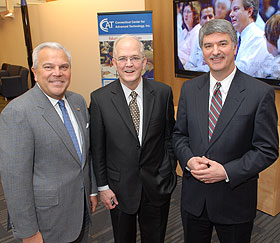  |
| HOME | THIS ISSUE | CALENDAR | GRANTS | BACK ISSUES | < BACK | NEXT > |
Center for entrepreneurship celebrates a year of success by Michael Kirk - January 28, 2008 | ||||
| A year ago this month, UConn’s Center for Entrepreneurship and Innovation (CCEI) opened for business in Connecticut and on Jan. 23, it officially moved into its new space in the Connecticut Center for Advanced Technology offices in East Hartford. An event held last week to recognize both milestones was attended by University President Michael J. Hogan; Lt.-Gov. Michael Fedele; State Senate President Donald Williams; the commissioner of Connecticut’s Department of Economic and Community Development, Joan McDonald; state legislators; faculty; students; and business owners. Funded by the legislature as part of the 21st Century Jobs bill that was passed in 2006, the center is a partnership between UConn’s Schools of Business and Law. It was created to facilitate “the development of transformational technology businesses in Connecticut” and enhance the state’s economic climate by assisting new and existing companies in solving complex business and legal problems. “After just one year, the Center is already providing the state’s economy with talented, knowledgeable, and skilled entrepreneurs,” said Hogan. “Creating the Center has been a true partnership among the University, the legislature and state government, and Connecticut businesses. For all of us, this is a good example of how we can proceed on a number of initiatives in the future that will require our cooperation and dedication.” The Center comprises many programs, including the business school’s Innovation Accelerator, Venture Consulting Initiative, Student Entrepreneurial Organization, and Family Business Program. Under the Innovation Accelerator program, teams of students and faculty work with entrepreneurial ventures with the goal of moving the businesses closer to the market by doing market analysis and working out strategic road maps and business models. The Venture Consulting Initiative provides experiential learning opportunities for students to serve as consultants with client firms. The Student Entrepreneurial Organization organizes conferences, panel discussions, and networking events to facilitate sharing new knowledge and best practices in entrepreneurship between students and inventors. And the Family Business Program deals with family-owned businesses in Connecticut, and key issues facing the development and operation of family-owned companies. The business school has also expanded the entrepreneurship curriculum it offers at the undergraduate, MBA, and doctoral levels.
The Center for Entrepreneurship and Innovation benefits the state in two major ways: first, it helps new and existing companies in critical technology-based industries to grow and contribute to the state’s economy; secondly, since students are an important component, it helps provide skilled, well-prepared graduates in these areas, says Richard Dino, associate professor of management and executive director of the Center. Noting that nearly 150 students from across the University and from a range of degree programs – including not only business and law, but also engineering and liberal arts and sciences – took part in the Center during its first year, Dino says. “We bring together exceptional University resources in a dedicated efforts to help the entrepreneurial community succeed. With innovative thinking and teamwork, one never knows what may trigger new products and business success. It’s a great formula for success.” As part of this center, the law school’s newly created Intellectual Property and Entrepreneurship Law Clinic is staffed by law students. Under the guidance of supervising attorneys, they provide pro bono legal advice to start-up and expanding businesses, both to protect their intellectual property and, more generally, to navigate the legal hoops required to establish a business and move it forward. The services the clinic provides include patent searches, patent filings and trademark applications, drafting non-disclosure agreements, and forming corporations and Limited Liability Companies. Through the Clinic, law students are now offered both a basic clinical course and an advanced fieldwork course in intellectual property law. These clinical courses provide a complement to an already wide array of intellectual property courses and to the School’s Intellectual Property Certificate Program. Since it opened, more than 130 companies from a wide range of industries have been aided by the Center, with an additional 45 scheduled for the spring. The clients include companies from the software, biotech, energy, and engineering industries. |
| ADVANCE HOME UCONN HOME |

